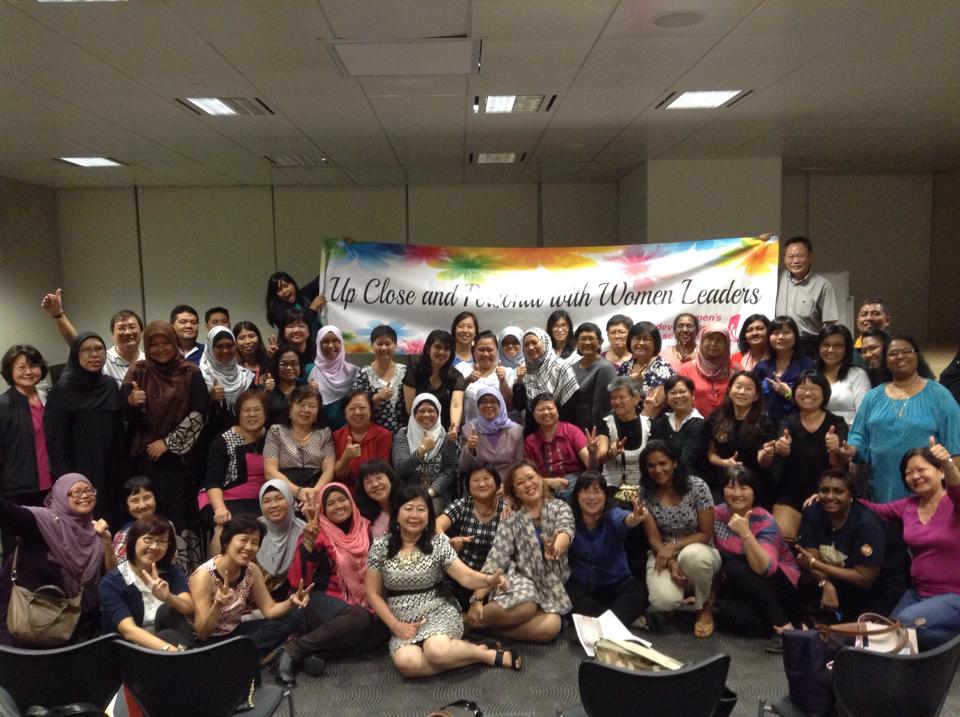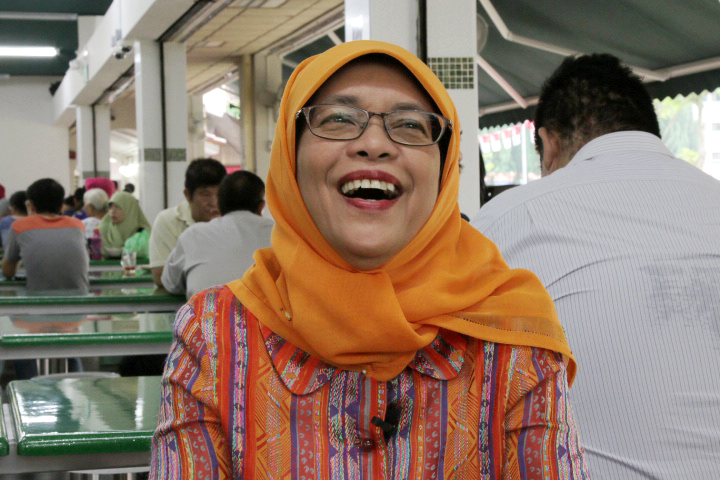Half an hour ahead of our scheduled meeting, Halimah Yacob walks up to us, unassumingly, small purse in hand, and greets us with a slightly tired-looking smile.
Although she's currently unemployed, she's been out of the house since about 7:20am for an 8am National Day observance ceremony at a factory in Bedok South.
And it's been one heck of a busy week for her - in the five days between August 6 and meeting us, she has done at least three media interviews, attended several National Day observance ceremonies (including one at the Istana the day before), all while packing her belongings to move out of her Speaker of Parliament office in City Hall.
Halimah is clearly an old hand here — residents continually wave at her as they walk past us, and occasionally, our conversation gets interrupted by particularly earnest seniors who pledge their support for her biggest endeavour yet: standing in the 2017 presidential election.
Her close-to-two decades of Member of Parliament time done in Jurong, and now here, kick in right away: a warm smile, a wave, and sometimes she stands up to shake hands and exchange a few words.
It fascinated us, therefore, to ponder the picture before us: a humble, unassuming, down-to-earth and widely-popular woman with a perfect backstory of rags-to-societal-success (not filthy riches, mind you).
Add to that decades of ground-level public service to top off a life story that is in equal parts poignant and identifiable for the masses, and it's a puzzle to comprehend her abrupt decision to give all this up.
To understand this, we delved into the key events in her life leading her up to this point she finds herself:
Joining the NTUC
 Halimah with a group of female NTUC leaders in April 2015. Photo via Halimah Yacob's Facebook page
Halimah with a group of female NTUC leaders in April 2015. Photo via Halimah Yacob's Facebook page
Halimah's nearly-40-year career in the public service is widely documented, as are her humble beginnings — the youngest of two boys and three girls, her father's passing when she was eight means she only had the chance to learn a select few words in Tamil, but largely grew up in a Malay-Muslim culture imparted by her late hawker mom.
She is also the first and only one in her family to put on a tudung, a choice she made when she was doing her undergraduate law degree at NUS. She opted for this, hoping to do "something completely different" from the arts subjects she studied in pre-university at Tanjong Katong Girls' School, and also to pick up skills she could use to help people.
The constant financial pressures she faced, from her long-haired sleeveless-Singapore Chinese Girls' School (SCGS primary and secondary)-pinafore days to figuring out how to pay for law school at NUS (especially being the first in her family to attend university) meant she had to find a job basically ASAP.
"(There) was a government job also. So I said no, I don't want that job. That's a lot more predictable. This one (NTUC) I don't know what is going on. I read the book, publications, but I've never had an encounter with the NTUC or the labour movement before, so I said maybe I'll go in and find out what it's all about."
Up once again for "something completely different", as we would find her wont to be throughout her career, Halimah hit the library — one of her favourite spots, interestingly — and pored through books on the labour movement. In particular, a tome on the 1969 Modernisation of the Labour Movement seminar proved handy for her interview, where she was asked about precisely that.
"Like you know, when you study in school ah, then you spot the questions and I spotted the right questions! Then of course, I ended up in the labour movement, and I really began to enjoy the work. I also like the cause, you see."
And so a very young "Miss Halimah" bravely went out to her first meeting, 39 years ago, with a group of 20 cigarette-smoking trade unionists two or three times older than her, ostensibly to provide advice on an industrial relations matter.
"My mentors in the labour movement are very good. They give me very good advice. One of them was supposed to be sort of my mentor ah, not officially. He told me: I give you one good advice. I ask him what. He says ah, don't go around flashing your degree. Not flashing in terms of paper lah… showing that you're so smart, you're a degree holder, and behave like that. He said you do that, half the battle you will lose already.
I remembered that advice very well. So I said ok, ok, you must listen more, listen more, listen more. So listen, very carefully. After all this is the first meeting, I was just new in the job. I didn't know much."
And eventually — this she counts as one of her biggest personal triumphs — these uncles would come to trust her, and go to her legal office (it started with just her and her boss, and even today only numbers around five) specifically asking to see her for help and advice.
Despite the small legal team she worked, and eventually led, Halimah would go on to take on many more challenges — managing her own unions, leading the NTUC women's department, and also the international relations division, just to name a few, eventually departing as Deputy Secretary-General.
Her 30-plus years with the union, which is still the longest stint she spent anywhere in her career, are certainly a period she continues to look back on very fondly — which is why she was immensely hesitant the day she was...
Being Invited To Tea
 The 2011 Jurong GRC team, helmed by veterans and batchmates DPM Tharman and Halimah. Photo via Jurong GRC Facebook page
The 2011 Jurong GRC team, helmed by veterans and batchmates DPM Tharman and Halimah. Photo via Jurong GRC Facebook page
Anyone with the vaguest of understanding of how Singapore's ruling party works will understand what it means to be "Invited To Tea".
Halimah, of course, was no stranger to this term at all, having personally declined multiple invitations during her time at the union. She openly shared with us the very close affiliation between the People's Action Party (PAP) and the NTUC:
"I mean, the NTUC always has a symbiotic relationship with the PAP. That was endorsed in our delegates' conference. So if I have any objection, then I would have objected to that.
But then I went through... during that period, when I joined NTUC and then I discovered these affiliations and all that, I asked myself one basic question: what is it that we are pursuing and is NTUC's objective compatible with the PAP's? My answer is yes, because here we are trying to improve workers’ welfare. The PAP is also trying to improve workers’ welfare in the sense that workers, as a subset of the entire Singaporean community lah.
So if that is the PAP's objective, workers as a subset of the entire Singaporean community that they're trying to improve, then I said there is compatibility lah. You could, when you’re in the labour movement, you can decide what unions in other countries do. You stand outside the decision-making process and you make noise and you try to influence the inside; or you can say okay, look, let's be inside and influence it from inside."
She laughed when we asked when she was first invited to tea and by whom, saying she can't remember — only that she declined twice, of course knowing what it was.
"I suspect lah. Hahaha! People don't ask you to come to just talk about the weather!"
When she finally accepted the invite on the party's third try, she met with the late Tay Eng Soon, and another person she doesn't even remember.
"They talked to me and they said that, you know, can you come another tea session? I said no, I'm very busy. Whatever you have in mind, I think I’m not the right person."
More invitations came, which Halimah continued to decline, until 2001 came round, and she heard from then-Prime Minister Goh Chok Tong himself — you could say it was an offer she could not refuse:
"So I went to see him. And that was then how he popped his question lah. You know, 'can you… We're thinking of fielding you as a candidate. You know.. What do you think?' I said I already said no before... hahaha. He said yeah, but you know, can you imagine — You're now serving. I said I'm already doing public service, you know, and I'm in the labour movement. He said ya.. but imagine, you can reach a wider group of people.
So I said, ya. But he said, 'think of the good that you can do. A wider good.' Then he said 'ok good, no, don't give me the answer now. You go back and think.' (He asked) me to go back and think la. (I had) no chance to say no...
So I went back, I thought about it. Maybe he has some point lah. There's some truth in what he said because our role in NTUC is important, but then there is a limit also lah. If you go, it’s a chance to also influence policymaking on labour, industrial relations matters, on workers. So I thought about it then I said okay."
And that's how she went into politics — standing as a candidate with Tharman Shanmugaratnam (fun fact: they entered politics in the same year and batch), she sailed through but also proved her mettle, as a popular and relatable MP on the ground, also pulling weight in Parliament on a variety of societal issues.
[related_story]
Taking on the role of Speaker of Parliament
 Screenshot from Parliament video
Screenshot from Parliament video
Almost five years ago, mere days after disgraced former Speaker of Parliament Michael Palmer resigned from his post, Halimah was approached by PM Lee Hsien Loong about stepping up to take his place.
Here's what she said as then-Minister-of-State at the MSF, according to a January 11, 2013 report in The Straits Times:
"I love what I'm doing now. But at the same time, duty calls. We must be prepared to accept new responsibilities when we are requested to do so."
Her appointment as Speaker reflected a well planned and considered process — from the time she was approached in mid-December, almost a full month passed before a closed-door meeting was held by PM Lee with PAP MPs on January 8, 2013, announcing her move.
This time, from the point she announced she was seriously considering her candidacy in the Presidential Election, to the day she announced it, a shorter period of about 22 days passed between them.
The deliberation process
 Photo by Angela Lim
Photo by Angela Lim
Halimah remains coy and sparse on the details surrounding her latest big deliberation process. She says she can't really identify who it was who first approached her to run, although she did let on that "many many people" did come to her only after it was decided that this year's would be a reserved election for Malay candidates.
"But you know, ideas somehow always form in our head over time, you know? It's not something like you immediately 'oh ok, tomorrow I'm going to take part.' You don't, you don’t. Because sometimes, ideas germinate over time and that's because people talk to you, they persuade you, they influence you, and they keep on telling you that look, it'll be good, it’ll be good, it'll be good for Singapore. It'll be good domestically, and internationally, you know. So then I began to think about it lah.
You know, I asked myself this question. What is it that's most important to me? Most important to me is whether I can serve Singapore and Singaporeans. So if that is the consideration then by taking part in the election, will I be able to do that? Although in a different capacity and different level? The answer is yes. Then I said ok. I will consider that...
The question is if all of us just think of ourselves lah huh. Ultimately we have to ask ourselves this question: Do we always think about what is our own preference, our own comfort level? Or do we then have to say that look, there's a point of time where you just need to think about things that are beyond us lah. About the country, about Singapore. That's important."
We asked if it was the fact that it was a reserved election that made her contemplate stepping out of her multiple current roles to run. She said, quite quickly:
"Well it doesn't really matter to me, whether is it reserved or open election. This is the point where I feel I can contribute at that level and that's why I decided to take part."
So can she do it?
Yes, she may not have managed a company with $500 million shareholders' equity , but Halimah argues that her policymaking experience balances, or perhaps even outweighs that requirement.
Also, she adds, being President is far more than being able to manage half a billion dollars. She raises the example of the late S R Nathan, who had to decide whether or not to authorise parliament to draw down our reserves during the height of the financial crisis back in 2008, 9 and 10.
"So what I said is, it's not the question of the dollars and cents alone. But it's your experience in policymaking. You know, your understanding of the ground issues. I've worked so extensively with workers. I have seen the devastating effects of job losses and retrenchment. And I've seen the devastating impact of, when you have crises like this, on the companies. I also went through the 1986 crisis, you know we had a crisis in 1986 the scale was much smaller. And then it was of course we recovered quite quickly but I've seen that, and I have that experience. So whoever is the president, it's not just dollars and cents but also the ability to exercise judgement when the time comes. To look at it and say ok, does this merit drawing down on our reserves or not? I think that’s important. That's number one."
First female President?
On the cusp of turning 63, Halimah not-so-secretly pressures her three married children with the fact that she loves babies and is hoping to someday be a grandmother, through pictures of herself carrying other people's babies on her Facebook page.
As president, it's true she would get to do plenty more of this (carrying babies and looking regal at events), but we did want to know what else she would find fulfilling about being Singapore's first female president.
Her answer: looking after and preserving the integrity of the public service as a whole.
"Many a country fails because of that issue, people are concerned that there's lack of integrity of public service.
The President also ensures that the reserves are protected. So those are very critical functions. And that affects not just one constituency. It affects not just the Parliament. It affects the whole country. Domestically, internationally. So it is a very important task. And it is a very different level of responsibility entirely."
At the end of our hour-long chat, Halimah sits through a Malay-language video interview, on top of another video segment from us, before politely excusing herself to head on to her next appointment with two communications managers accompanying her.
Our biggest takeaway, though, apart from her half-finished teh-o kosong, is a woman who is definitely intellectually and professionally ready for the presidency, but who might not have started with the immediate instinct or ambition to seek higher office.
Here are some equally interesting but totally unrelated stories:
6 life hacks you never knew could save you tons of water
Who looks after our ailing seniors outside of general hospitals?
Top photo by Ilene Fong
If you like what you read, follow us on Facebook, Instagram, Twitter and Telegram to get the latest updates.



